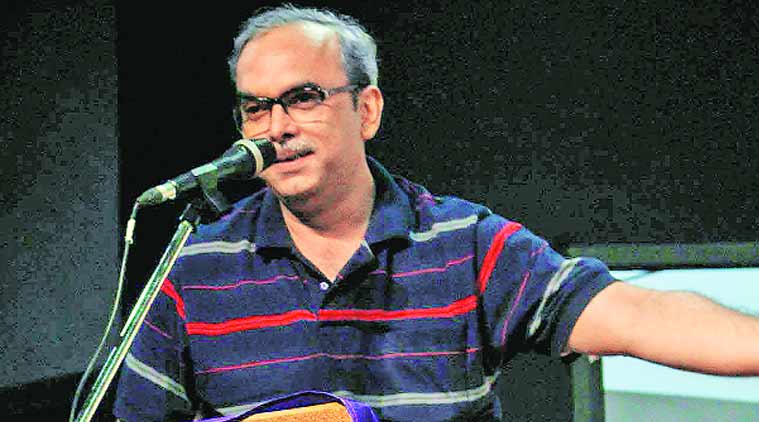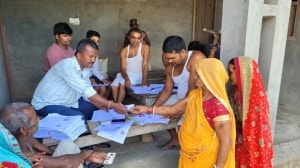Stay updated with the latest - Click here to follow us on Instagram
At IIT-B, a different ‘freedom’ struggle tastes success
According to the current core team, to many, Saathi became a local word for 'gay' and the campus found a language to begin with.
 The Saathi team values the support they have received from faculty like Dean of Student Affairs Prof Soumyo Mukherjee
The Saathi team values the support they have received from faculty like Dean of Student Affairs Prof Soumyo Mukherjee
* Is homosexuality an illness? No
* Sometimes men love women, sometimes men love men
* Sometimes women love men, sometimes women love other women
While this was part of a presentation on “sexual orientation” for freshers at IIT- Bombay in 2011, the fresher orientation video this year was an ‘ode’ to friendship that went beyond the sexual orientation of a person. The efforts were by Saathi, which is probably the first-ever institute-backed campus support group in India for “lesbian, gay, bisexual, transgender, queer and questioning (LGBTQ) people” at IIT-B. Started by a group of students, faculty and alumni, Saathi is a home for LGBTQ community at IIT-B and is meant to be a “safe space” for people coming to terms with themselves and their sexuality.
It was co-founded in 2011 by IIT-B alumnus Harishchandra Ramadas, the first open gay student of the institute. According to the current core team, to many, Saathi became a local word for ‘gay’ and the campus found a language to begin with. In a write-up titled Gay @ IITB: Out and About for IIT Bombay’s newsletter Insight, Ramadas narrates how he had to seek “refuge in the institute library all through my first year, avoiding nearly all social contact”. He writes, “I wanted to get a good CPI (score), flee this godforsaken country (as I then considered it), and begin life afresh in a liberal, tolerant western nation.” It was these feelings of “no freedom to express oneself” and “not belonging” that Saathi attempted to minimise. And what started as a two-member group now has 262 students, faculty and other staff members — not all of them from the LGBTQ community.
“We get approached by closeted, scared students on campus and we try to meet and talk to them. Many faculty members attend Saathi events as supporters. There are faculty members across departments who have helped us with venues etc for the events. We organise meets at various places on the campus. This includes cafes and staff quarters. We also have movie screenings. For instance, Margarita with a Straw was screened last fortnight,” says Aditya Joshi, a PhD student and member of the core team of Saathi.
“The screening of Margarita with a Straw was attended by our Dean of Student Affairs Prof Soumyo Mukherjee, who congratulated us for the event. Such support from the faculty is unprecedented in any institution in India. The administration has been very supportive of all our endeavors even when the question of legality is being shrugged by the powers in the country,” says IIT-B student Aditya Shankar. A key aspect of Saathi is conducting the yearly introduction session for the students. This year, for instance, the video titled Mere Saathi had three IIT-B students Joshi, Anisha Bajaj and Shankar talking about what it meant for them to come out and their ‘straight’ friends sharing their take on it.
“In 2005, I told one of my closest friends about myself and it changed the way how I perceived myself. I strongly believe that the person I am today — confident, happy — is because of my straight friends who have stood by me,” Joshi says in the video. His friend Abhijit Mishra says, “Aditya never seemed different to me, I never considered his orientation, and neither should anyone,” adding in his native Oriya language, “value your friendship, don’t let any parameters affect you. Friendship is priceless.”
There are open sessions too, where anonymously posted questions about LGBTQ people are answered by the resource group. “Saathi has also participated in department-level introduction or orientation programmes, and introduction programmes by the counselling cell of IIT-B. The idea is to reach out to these ‘general’ forums to tell closeted LGBTQ people to feel better about themselves, and to tell the non-LGBTQ people that the campus stands by non-discrimination towards LGBTQ people,” says Bajaj.
According to the students, the milestones for the resource group have been the introduction videos that show different aspects of LGBTQ people, like love and friendship, where the students aim to break existing stereotypes. On December 11, 2013, when the Supreme Court gave its judgment on 377, there was a spontaneous solidarity march at IIT-B and what made it more special is that the organisers were mostly the non-LGBTQ members of Saathi.
The group is currently executing a project called Saathi Connect. It is a multimedia anthology of LGBTQ people and currently has 50 written stories and 10 video interviews. “These are LGBTQ people from across the country talking about different aspects of their lives in English, Hindi and Marathi,” says Joshi. The project wants to bridge the gap between the queer movement and the youth. It includes voices in English, Hindi and Marathi.
“The choice of vernacular is very relevant as a majority of the youth in and around Mumbai speak either of the three languages. The project is funded by the Foundation for Rainbow Solidarity in France and is executed by us at Saathi, IIT Bombay,” adds Shankar.







